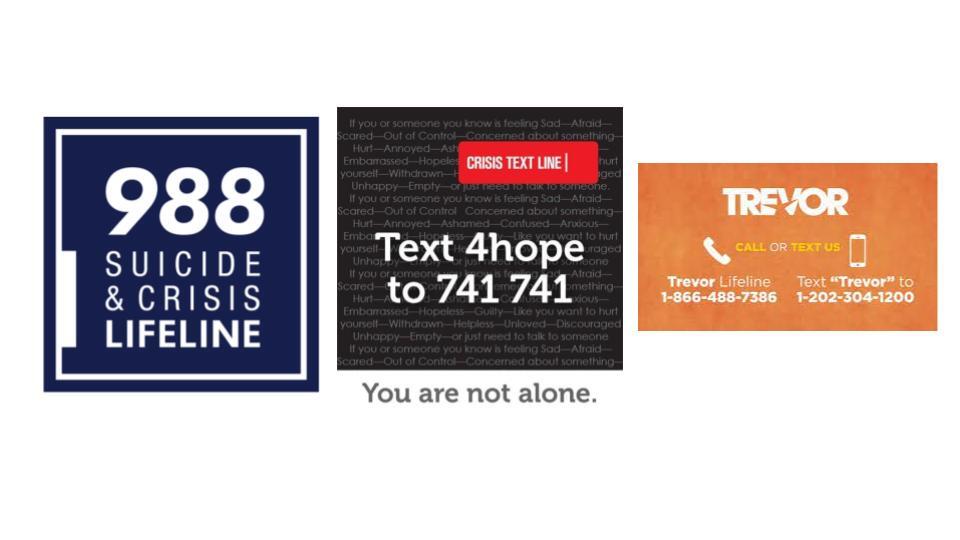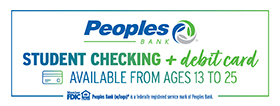Mental Health Resources
With the safety and well-being of our students as a top priority, we recognize that strong mental health plays a vital role in a student's growth and success. Franklin High School offers a variety of services and supports to meet the mental health needs of our students.
MENTAL HEALTH RESOURCES AT FRANKLIN HIGH SCHOOL
Student Support Counselor - Mrs. Jocelyn Bialk
- Phone Ext. 1232
- JBialk@franklincityschools.com
The Student Support Counselor is a licensed mental health counselor (LPCC-S) who is available to all students.
The goal of the counselor is to address anything (related to social/emotional or basic needs) that would serve as a barrier to learning and being successful in school. Typically these are acute issues that arise throughout the school day.
The counselor coordinates and assists with:
- Addressing short-term social emotional issues through supportive counseling
- Collaborates with staff and fields concerns about students
- Conducting Risk assessments
- Referrals to community resources to address things such as basic needs or more intensive mental health services
- Coordinating building-wide social-emotional learning for students 9-12
Catalyst Counseling
Catalyst Counseling, LLC provides holistic and strength based mental health counseling services in a school setting. Therapists promote optimal academic/school functioning, developmental assets, and overall health and wellness to help people live happier more fulfilling lives. Catalyst Counseling’s school based therapy program has the advantage of providing early detection and immediate intervention, accessible and convenient services, and effective collaboration and coordination between schools and families. Building strong relationships is at the forefront of Catalyst’s school based services to provide more effective advocacy for students and families within the school setting.
Here is how to reach out if you have concerns about your child's mental or emotional health or simply want to consult with a therapist about what’s going on: Speak to your child’s school counselor, teacher, or administrative team to request for your child to be referred to Catalyst Counseling. You can also call your school district’s Catalyst team lead, Kim Kleinhans, at 937-668-9153.
Social Emotional Learning
During Advisory, students will spend one day a week learning about a topic related to Social Emotional Learning (SEL). There is a new topic every month with a different lesson every Monday. Students will learn about a variety of topics that will be useful to his/her personal and academic success (ie: Study Skills, Start with Hello, stress management, sleep, diet, anxiety, relationships, etc).
- August: Students learned how to access the counselors for support, in addition to understanding what SEL is and why it’s important.
- September: Students participated in the national Start With Hello program along with schools across the country. Start With Hello is a program that raises awareness and educates students about addressing loneliness and social isolation at school. The goal of the program is to create a culture of inclusion and connectedness at our school. Students who are chronically isolated can become victims of bullying, violence, and depression. This month, students learned how to recognize and respond to social isolation, helping others, and making for a more inclusive and welcoming school. The Start With Hello program is part of the Sandy Hook Promise organization which was created after the tragedy of gun violence at Sandy Hook Elementary School in December 2012. This mission of Sandy Hook Promise is to educate and empower schools, communities and parents on how to prevent violence BEFORE it happens by providing mental health and wellness education and prevention programs.
- October: Lessons focused on Conflict Resolution, specifically the causes of conflict, how to prevent conflict, and what to do if you are involved in conflict or witness conflict.
- November and December: Lessons are focused on Empathy with an emphasis on how to differentiate between empathy, sympathy, and compassion. Students explored their own experiences with empathy and took a few quizzes to help them understand their own approach to empathy. Students learned about "empathy busters,” in addition to hearing other people's experiences through multiple activities - the goal being to consider others' experiences when responding to them and continuing to build relationships with others.
- January: This month's advisory lessons will be focused on social awareness, perspective, and understanding others. Students went through several activities around illusions, examining perceptions, understanding body language in communication, and getting to know more about each other, breaking the assumptions we may carry around.
- February: February is Teen Dating Violence Awareness Month. This month, we'll shift our advisory lessons to discussing healthy relationships, both friendships and dating relationships. We'll discuss traits of healthy and unhealthy relationships, boundary setting, digital abuse, and consent. These lessons are brought to us by the organization Safe on Main in Lebanon.
- March and April: Students will be talking about mindset, specifically about thinking errors, also known as cognitive distortions. We all use these, whether consciously or not. Thinking errors often serve as barriers to success, whether that be academically, in communications with others, relationships, and confidence among other things. If thinking errors are reinforced, they can contribute to mental health issues such as anxiety or depression. By teaching our students about these common thinking errors or thinking traps, they can have an awareness and learn to approach difficulties from a healthier perspective. See this link for a quick snapshot of the thinking errors we will cover.
- May:
Crisis Hotlines



